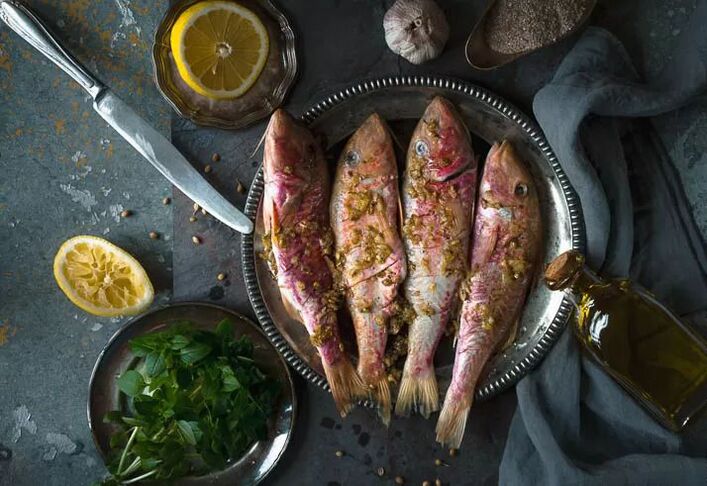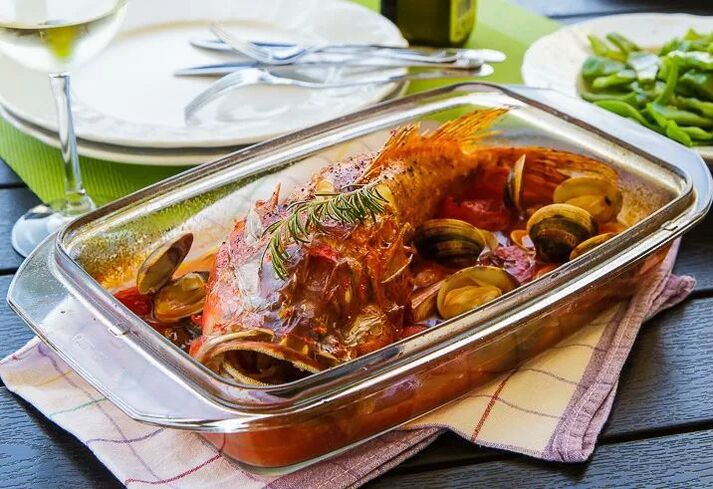
Main rules of the Mediterranean diet
- Consume large amounts of monounsaturated fats.Olive oil and other sources of monounsaturated fatty acids are widely used in cooking and provide up to one-third of calories.
- Meat consumption levels are low.Traditionally, meat in Mediterranean countries was eaten on special occasions rather than every day.
- Eat plenty of fish and seafood.Marine proteins in the Mediterranean diet function as a meat substitute, so people eat them regularly.
- Eat plenty of vegetables, fruits, legumes, nuts, and whole grains.The permanent place of vegetable and vegetarian dishes on the Mediterranean table is due to the favorable climate, and the most common dessert is fresh fruit.
- Dairy consumption average.The main dairy product consumed in Mediterranean countries is cheese; it is no coincidence that the largest quantities of cheese in the world can be found here.
- Average amount of alcohol consumed.Residents of Mediterranean areas tend to drink alcohol regularly, but in small amounts. Usually this is a glass or two of wine with lunch and dinner.
- physical activities.Although this item is not directly related to diet, residents of Mediterranean countries tend to lead active lifestyles and spend a lot of time outdoors.

Benefits of the Mediterranean Diet
- Promote vascular function and reduce the risk of cardiovascular disease;
- Prevents inflammatory processes and restores damaged cells;
- Reduces the risk of cancer and diseases such as diabetes, asthma, and Alzheimer’s disease;

If you want to get started but don't know how
buy olive oil
eat olives
Eat more fish
More vegetables, good and different
Pasta is good

Eat less sweets
Mediterranean Diet: This Week's Menu
- First of all, the combinations of appetizers and main courses are given based on my subjective thoughts on food. There is no hidden logic in it. The dishes listed on the menu can be shuffled at will if you like.
- Second, the menu is designed for people who work seven days a week and only eat at home on the weekends. If this doesn't apply to you, it's equally possible to shuffle dishes from the suggested menu or alternate.
- Third, the menu is not limited to any particular season. If certain products required for a suggested recipe are not currently available, you can - well, you get it! — Adjust the menu to the seasons.
- Fourth, don’t be surprised if you see dishes on the menu that at first glance don’t match your idea of the diet of the inhabitants of the Mediterranean. In Italy, many people are unlikely to eat cottage cheese and sour cream for breakfast - however, these products are very suitable for the Mediterranean diet.
- Finally, if you want to change dishes or expand the suggested menu, study the recipe catalog.

on Monday
sour cream cheese
Fresh Beet Salad
Fried cod and quick sautéed spinach
seasonal fruit or berries
Tuesday
Natural yogurt with honey or jam
Lentil Soup
Chicken Gherkins and Cucumber and Garden Herb Salad from the Oven
seasonal fruit or berries
Wednesday
sour cream cheese
Toasted Bread with Roasted Peppers and Cheese
Fish and rice with vegetables
seasonal fruit or berries
Thursday
Sugar-free cereal with yogurt
vegetable soup
Cherry Tomato and Basil Pasta
seasonal fruit or berries
Friday
Natural yogurt with honey or jam
Calamari and Fennel Salad
Beef Sausage with Chili Sauce and Roasted Vegetables
seasonal fruit or berries
Saturday
Shakshuka
Fish soup
Grilled Squid with Tomato
Caprese Salad
Eggplant, Lamb and Bulgur with Green Beans
Figs with honey and rosemary
Sunday
Homemade cupcakes
Roasted Pepper Soup
spaghetti
Stir-fried shrimp with garlic paste
Halibut and Rosemary Potatoes in the Oven
baked apple






















